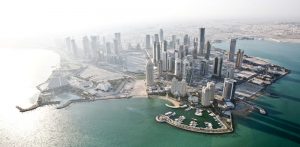 Despite the economic blockade imposed by its neighbors and a plunge of crude prices, Qatar’s economy is still projected to expand by 3.1% in 2018 up from 2.5% in 2017.
Despite the economic blockade imposed by its neighbors and a plunge of crude prices, Qatar’s economy is still projected to expand by 3.1% in 2018 up from 2.5% in 2017.
The real GDP growth is expected to pick up on account of recovery in global crude oil prices and their positive spillover effects on both hydrocarbon and non-hydrocarbon GDP, Governor of Qatar’s Central Bank, Sheikh Abdulla bin Saoud al-Thani told the press.
In the non-hydrocarbon sector, the construction sector is expected to drive the growth, offering large opportunities for investment in projects related to the 2022 FIFA World Cup.
Qatar has recently announced a visa-free entry program for 80 nationalities to stimulate the tourism sector.
“The available data shows inflation to remain benign in 2017 as well as in 2018, while our current account is poised to record considerable surplus. The fiscal consolidation process is expected to bring in some stability to the economy by underpinning oil and non-oil revenues,” Sheikh Abdulla said.
The trade, tourism and banking sectors have been worst hit by the restrictions put in place since June by Saudi Arabia, the United Arab Emirates, Egypt and Bahrain, according to Moody’s.
It estimates that about $30bn has flowed out of Qatar’s banking system and expects further withdrawals.
The Qatari government stressed that it had sufficient resources to defend its economy during the crisis with Gulf neighbors, but foreign investors took flight with no progress being made towards a resolution.
